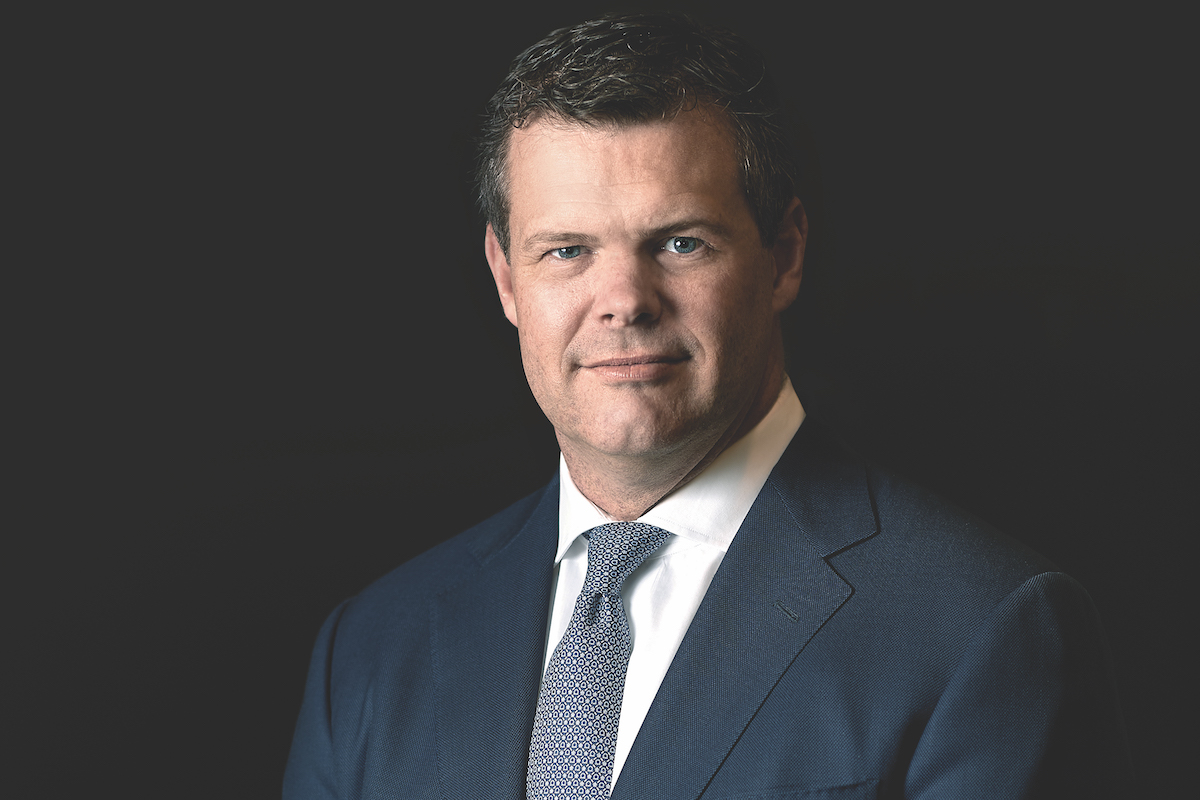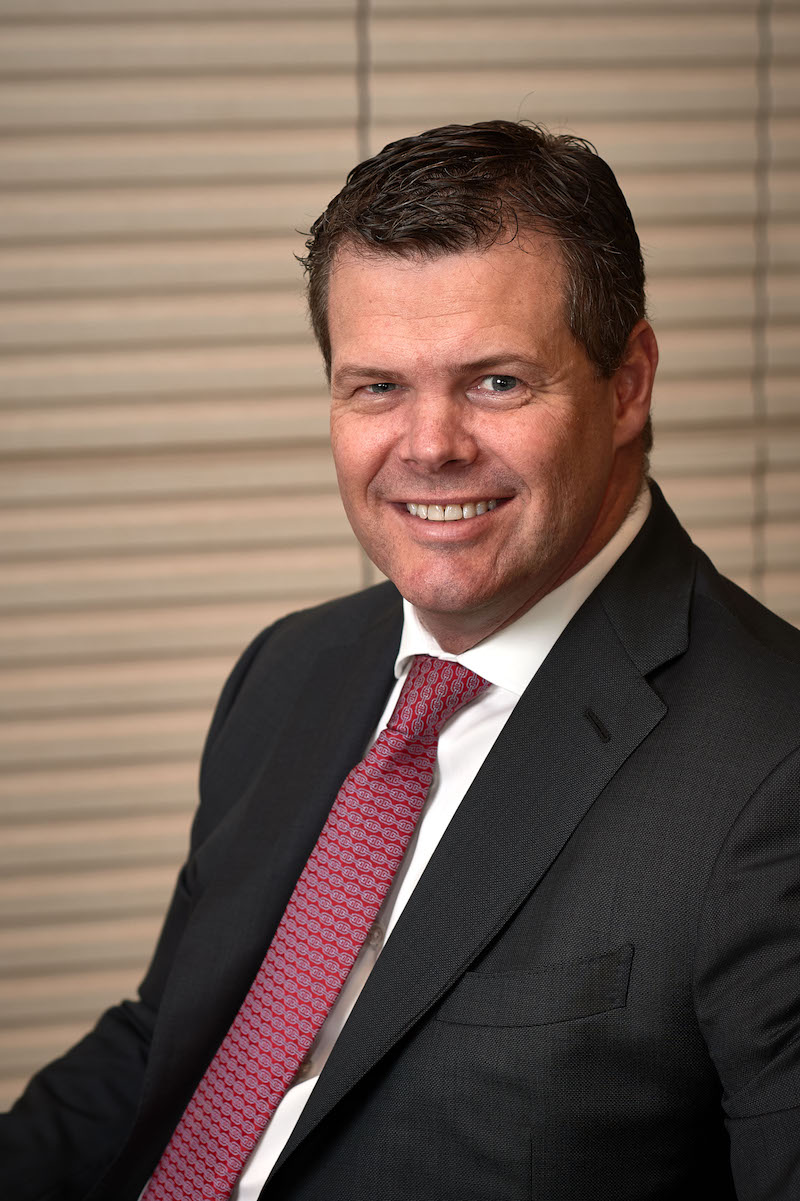While Paul McNamee’s foray into the insurance industry was triggered more by accident than design, he admits he learned how to calculate risk from an early age.
Chubb’s Asia–Pacific Regional President was 20 when he returned home to Sydney after an extended gap year abroad and saw an opportunity to start his corporate career at Cigna International, a predecessor company of Chubb.
Paul was fresh to the corporate world in 1995 and had little idea where the path would eventually lead him. In those early days, he developed a fascination for the industry, he tells The CEO Magazine. “I became a keen student of the business. I was genuinely interested, and I naturally enjoyed it,” he reflects. “Within a few years, I knew this was something I wanted to do for the rest of my career.”
“I knew this was something I wanted to do for the rest of my career.”
As part of the commercial property team at Chubb, Paul worked as an insurer for the assets of many of Australia’s largest companies, including major banks, airports, airlines, retailers, investment funds and government organisations.
“Determining the nature and pricing of the risk is what I found fascinating,” he says. It spurred him to take an active interest in how to run a business portfolio from a management standpoint.

In 1999, insurer ACE acquired Cigna’s global property and casualty (P&C) business, later taking over Chubb in 2016, retaining the well-known Chubb name. “Both organisations aligned as strong underwriting companies and had a solid alliance of what the future should hold,” Paul remembers.
“We identified, very early, the relative strengths of both organisations and as we charted the course for the integrated business, we had a very clear vision of what we wanted to achieve in both the long and short term. We invested in that future and we are now executing with a high degree of focus.”
Now the largest publicly traded P&C insurance company in the world, with more than 30,000 employees globally, Chubb has spread its operations across 54 countries and territories, specialising in the assessment and management of risk with a range of insurance products and services.
Growth in Asia
Paul oversees more than 3,500 employees and an extensive network of operations in the Asia–Pacific region across 100 offices, serving Australia, China, Hong Kong, Indonesia, Korea, Macau, Malaysia, New Zealand, the Philippines, Singapore, Taiwan, Thailand and Vietnam.
Covering such an expansive and diverse portfolio with broad demographics calls for a wide product offering.
The range of products varies greatly from country to country and can also differ within countries. In Australia, for example, where the company has been focused on commercial insurance, targeting large corporates and wealthier customers, Chubb is now also offering its services to smaller enterprises and mid-tier companies.
“In Asia, it’s very different. For example, in Thailand we provide travel, accident and health insurance to consumers through our valued partnership with Siam Commercial Bank (SCB), which has well over 10 million customers spanning all demographics. We service all of those customers with both personal and commercial products, including specialty consumer products like handset insurance.”
“We’re prepared to meet the market demand where it arises,” he explains. “Dental coverage has been very successful for us in Korea, while in Indonesia, we sell a lot of auto insurance. It’s quite broad and it really varies by geography, depending on local demand and our ability to create value for the customer.”
Asia–Pacific is one of Chubb’s fastest-growing regions, and arguably one of the most challenging global insurance markets.

Not only is there wide diversity between countries, there are countless risks posed by natural disasters, including cyclones and earthquakes, and the area spans countries in varying stages of economic, social and technological advancement.
To add to that, in developing economies, there is a low level of insurance awareness among individuals, many of whom are suspicious of investing in a product where no tangible return is evident.
However, Asia’s emerging middle class, along with a strong growth in commerce and industry that naturally expands business assets and liabilities, is promising for the insurance market.
Paul explains that Chubb’s growth in the region comes down to its ability to insightfully evaluate the nature of risk, price it and distribute effectively through its multiple distribution platforms and partnerships.
“When you look at the Asia–Pacific region, we distribute our product through more ways than any other region in the world,” Paul explains. “The company has grown from a large commercial insurer; we’ve expanded our product range aggressively to meet the demand of our customers.”
Paul reels off a list of products Chubb specialises in, distributed through telemarketing, banks such as DBS, SCB and other financial institutions, telecommunication companies, brokers, airlines and digital platforms such as Grab, a technology company offering ride-hailing transport services, food delivery and payment solutions.
“Distribution partnerships and the expansion of product really got us to where we are today. That’s been the growth story of the region in places like Thailand, Korea, Malaysia and Indonesia, with our agency forces and now financial institution distribution partnerships,” he says.
“In Australia, over the past year or two, we’ve seen terrific growth out of our independent broker business and we’ve been very focused on servicing those partners. Then, of course, we have agents, both exclusive and market agents, in many countries throughout Asia.”
Digital adaption
Paul explains that when he first started in insurance 20 years ago, decisions were based more on an individual bias rather than hard, analytical facts. “Analytics have become much more of a reality and a profound tool,” he says. With more rigorous data, new areas of risk have emerged.
Paul points to climate change risk alongside the increasing number of natural disasters and growing environmental concerns. He also talks in depth about cyber risk, which has influenced the increasing popularity of policies against cybercrime.
Last November in Singapore, Chubb and partner DBS launched CyberSmart, a product that provides cover for victims of cyberbullying and identity theft. Its demand has grown, with daunting statistics showing three-quarters of children and teenagers are bullied online in Singapore.
CyberSmart covers expenses for trauma counselling, legal consultation and 24/7 IT support where computers have been hacked.
The product also covers loss of income, legal consultation and tech support for identity theft, which affected 16.7 million people globally in 2017. “DBS and Chubb wanted to get involved in helping people deal with the fallout from these crimes and CyberSmart was the result,” Paul explains.
“It’s a cool product and only costs about S$6 per month. It’s one step we’ve made towards adapting to the emerging risks that the digital world can create, and we hope to roll it out to other countries as well.”
There’s a whole lot more Paul would like his industry to roll out. In fact, he’s refreshingly candid about the shortcomings of the industry he’s worked in for more than two decades.
He believes it is time to embrace new technologies and revamp products with more flexible options, particularly to target a younger generation.

“We’re in a digital age when consumers of the future are not going to rely on an app to buy insurance. They expect it to be put in front of them in their social networks or other lifestyle applications, at the appropriate time and the appropriate price. They don’t want to go outside what they’re doing digitally to have to buy insurance,” he explains. “They want the product to be relevant to them.
“The industry has traditionally pushed full-coverage products even though people may only need a small element that suits their individual needs. The rising middle class in Asia are financially and digitally savvy. They’ll buy a product when it suits their individual price point. No longer can we assume we can build coverage at a high price when they only require a fraction of that coverage,” he explains.
“The industry should be thinking about daily and monthly products that suit people’s needs. If we are serious about increasing insurance coverage for the rising consumer in Asia, we cannot use antiquated, expensive products with high frictional costs and think that one day those consumers will wake up and decide they need it.”
The underwriter is streamlining insurance to appeal to our fast-paced, technologically driven world and younger generations. “It’s great to be in a region and an organisation which is pioneering in digital capabilities and simplistic product design,” he says.
“Products that use technology are, quite honestly, a much more efficient way of doing business with people in our region.”
“Insurance needs to be more efficient and linked to the daily lives of people,” Paul insists. “As an industry, we need to adapt, embrace technology and align ourselves with how it can change people’s lives. Insurers, intermediaries and regulators should all be supporting insurance products that are relevant to the new consumer. It’s all coming.”
“As an industry, we need to adapt, embrace technology and align ourselves with how it can change people’s lives.”
Shining stars
Meanwhile, Paul is satisfied that Chubb is serving the industry well, with awards and positive customer feedback testament to the company’s excellent service and promise to pay claims fairly and promptly.
Over the past two years, the company has been awarded three gongs at the prestigious Mansfield Awards, which recognise claims excellence in the Australian industry, including the Gold Mansfield for overall excellence in claims.
Chubb bagged another three at the 2018 National Insurance Brokers Association Convention for General Insurer of the Year, Best Broker Experience and Most Trusted Brand.“We’re honoured to receive our fair share of awards,” Paul says.
“But it’s the feedback from individual customers that’s really important. We receive strong feedback on claims. What we sell is a promise to pay and if you look at the reputation we enjoy, both globally and locally, that’s more coveted by us than anything else. It’s not a strategy or a tactic to simply pay claims well. We don’t talk about how we are going to do it this week or next week. It’s cultural, natural and simply in our DNA as a company.”
“It’s not a strategy or a tactic to simply pay claims well … It’s cultural, natural and simply in our DNA as a company.”
“If you were to ask anyone who’s had a claim with Chubb, you would hear we make the process easy. We understand that customers with a claim have recently been through some form of trauma, whether personal trauma or that of the organisation they’re associated with. Our job is to reduce the burden of that trauma as much as possible.”
“It really comes home to us when we look at customer retention. We’re often not the cheapest insurer, however, we retain well above 90% of our customers year in, year out and that statistic is even higher for those who have experienced a claim. To us, that’s the most important statistic. It proves our customers want to continue being insured by us, especially after they have suffered a loss and we have helped them in some way to deal with it. They feel they’re being genuinely treated with respect and understanding, and for most of our customers, that’s why they insure with Chubb.”
On leadership
While Paul concedes falling into a career that he grew to love was more about luck, he doesn’t believe his experience is unique. “It’s a rather common story,” he says.
“I don’t think anyone leaves high school thinking ‘I want to be an insurance executive’. How many people really see their vocational future in their late teens and early 20s? It’s a big call to decide at that age and finding the right career path is often a process of elimination or being in the right place at the right time.”
Paul’s own career lightbulb moment timed well with ACE’s acquisition of Cigna, which opened up opportunities for Paul, including overseas postings from 2000. “While I was doing property insurance in Sydney, I was asked to go to Hong Kong to run our North Asia property business. At that time, I was in my mid-20s,” he recalls.
“I did two years there and then was promoted to run a property business in Asia–Pacific.”
In 2002, Paul was off to Singapore for a two-year stint as head of Property and Technical Lines for Asia–Pacific, before heading back to Hong Kong for a year as COO.
In 2005, he was posted to London, moving across with his wife and two young children, to take up the role of Executive Vice President and Head of ACE’s International Property and Technical Lines.
Paul admits it was a confronting time. “I was only 29 at the time,” he reflects. “I was much younger than all of the people I was managing. But I was fortunate. I’d had great exposure to senior management in Hong Kong and Singapore but still, it was important to earn the respect of my peers and those I was working with on a daily basis. And in our organisation, it’s pretty apparent from your first moments that respect really is earned, largely through performance.”
During that time in London, he admits that “our results weren’t terrific” and “we had a lot of work to do on our portfolio”. “While it wasn’t severe,” he says, “there were issues that needed fixing.” But, he grants, the team managed to improve the business.
“Things were turned around and those issues were fixed. Not just by me but by the whole management team. We managed to turn the results around and then built it for the long term, putting in place certain things so problems wouldn’t recur,” he explains.
Paul completed another stint in Philadelphia in 2009, which lasted several years, before finally returning home to Sydney in 2013. Since his appointment as Regional President in 2016, he is often on the road which makes family time even more significant.
“Holidays are particularly important to us as a family. We also love the beaches in Australia or spending time boating on Sydney Harbour.”
“It’s definitely a balancing act,” he adds. “It means that when you are present, you need to be really present, because there’s a difference between just being there and really being present. Getting it right as a father and, indeed, getting it right as an executive is a question of discipline and your ability to allocate time in a way that is real to both. To your family and to the business. I believe that is one of the greatest challenges for any executive.”
When it comes to leadership, Paul says, “If you don’t have a vision for your business, you have no business being a leader. You need to have a vision and you need to be able to communicate that vision to take the organisation over the short, medium and long term.” It starts with being able to make strategic and tactical plans and articulate those plans to the leadership team and employees,” he says, adding “that it’s also about accountability.”
“You have to hold people accountable but especially hold yourself accountable. As a leader you have no option but to hold yourself accountable. If you don’t set the example, your message and the discipline to execute simply dissipates as you go through the organisation.”
Chubb’s commitment to volunteerism
Chubb is committed to helping clients manage environmental risks. The company has been a pioneer in developing advanced environmental insurance solutions, including coverages for premises-based exposures, contractors’ and project pollution liability, renewable energy, clean tech and environmental clean-up projects, as well as ‘green building’ consulting services and a property policy that enables greener rebuilding after a loss.
Chubb’s role in mitigating supply chain and global operations risks through its risk engineering services helps organisations identify climate-related exposures and provides risk management expertise to help manage environmental challenges caused by climate change.
In June last year, in collaboration with global law firm Clyde & Co, Chubb launched a new report, ‘Global Management of Environmental Risk’, which explores the impact of environmental risks on multinational businesses.
It is an update of a 2015 report that focuses on how increases in global legislation have become the biggest change to environmental risk. According to Chubb, the report “reviews the different environmental risks facing these corporations and how traditional risk management techniques are leaving companies exposed to unnecessary risks – both financial and reputational.”
The report also provides a practical four-point checklist of questions to ask when establishing insurance and risk management programs, as well as overviews of the latest regulatory changes across a number of leading regional markets.”


